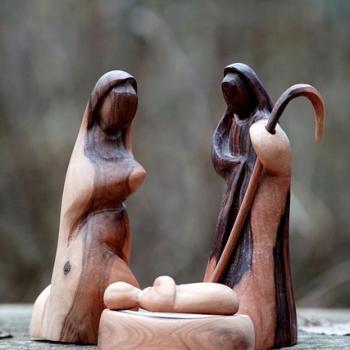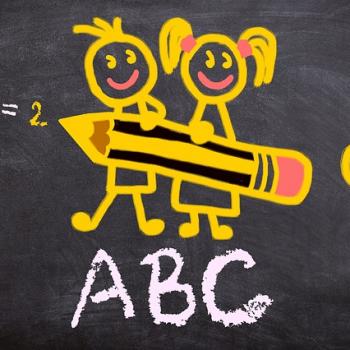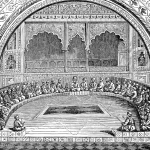
I thought about Our Lady of Peace again, the other day.
Our Lady of Peace is the name of the horrible parish school I attended in Columbus, from third grade until halfway through fifth when I had my nervous breakdown and was homeschooled. Our Lady of Peace was infested with bullies, as I’ve mentioned several times before. The bullies would tease and call names and sometimes physically assault the socially undesirable children like me, and the cold fish of a principal and the adult volunteers who patrolled the playground would make it worse. If they caught a group of children engaging in any kind of fight, they would punish both parties, making both of us “sit out” on the playground or stay in at recess until we’d hashed out our differences with a talk. Then they’d release us back onto the playground, where the abuse would continue unabated until we got caught again. And that was just the overt violence and teasing, mostly by boys. There was also a robust culture of shunning, silent treatment and humiliation among the girls, which was, if anything, worse. After I left Our Lady of Peace I had nightmares about the place for years. But at least we weren’t at a public school where we might not have been taught our catechism.
At Our Lady of Peace, there was a boy. Let’s say his name was Carl. Carl was on every bully’s hit list.
I don’t know why he was so despised. I know why they went after me. I was fat, ugly, and eccentric; I was neuro-atypical before anybody labeled problem children as neuro-atypical. I always had stomach aches and a runny nose because of my undiagnosed wheat sensitivity. I was annoying because I so easily got indignant and blurted out what I was thinking, no matter the consequences. I was fun to tease because I melted down at the drop of a hat. I was no good at sports. I was needlessly theatrical and did all the voices when it was my turn to read aloud. I liked to read Tolkien and wander around the edge of the playground, talking to trees. I picked wildflowers to make magical potions and spent the rest of the school day with my hands smelling like wild onion. But Carl wasn’t like me. He shouldn’t have been a misfit. He had no imagination; he played football with the other boys at recess. He did his reading in the expected monotone. I think his grades were average. He was a little tall and plump for his age, but nothing like the tallest or fattest boy in class. He wasn’t very tidy and he didn’t smell too nice, but no boys in the third and fourth grade were clean. He had freckles and handsome blue eyes. There was no reason for everyone to despise Carl, but they did. And they let him know.
The bullies abused Carl. The boys who were normally reasonable or kind pushed him away with “Shut up, Carl!” or “Get lost, Carl, your whole family’s ugly.” The girls who openly flirted with most of the boys made disgusted faces as he walked by. The girls who didn’t have time for boys took extra time to express their disdain. When he read aloud in class, he was laughed at. When he dared to ask a question, the class jeered. It happened every day.
His name was close to mine in the alphabet, so we often sat at desks side by side– me, despised, drawing elaborate floor plans for fairy tale castles and getting ink on my fingers and wrist. He, despised, doing nothing unusual, but still treated like a circus freak.
Maybe it was our close physical proximity that started the rumor that Carl and I “liked” each other. Or maybe it was the fact that we were both unlovable. Or maybe it was that morning when Mrs. Adams drew names out of a hat so we could be assigned to exchange lunches and have a special meal with a randomly chosen new friend. By the luck of the draw, I ended up exchanging my cream cheese bagel with Carl’s Lunchable and chatting with him for fifteen tense minutes. Afterwards, somebody asked me how the lunch date had gone, and instead of expressing revulsion I’d said “He’s just a boy. Boys are gross. He’s only as gross as any other boy. I don’t know why people hate him.”
In any case, we were declared an item.
Do you remember being about ten years old, when children first start teasing one another for “liking” someone?
At just a little older, being a couple with someone becomes a goal. But in that first wave of grown-up sexual attraction, “liking” somebody is shameful, gross, something you get teased for. So I was humiliated when people started ribbing me for “liking” Carl. I did not like Carl. I didn’t like any boy in my class. I liked some older boys who had been in the school play. I was madly in love with Julia, one of the only girls who would speak to me, but I couldn’t very well talk about that. I protested that I hated Carl, just the same as I hated the other boys, but no one would believe me.
One afternoon, at lunch, things reached a crisis. All the girls were sitting on the unofficial “Girl” side of the long folding table, where we always sat, toward the door. Almost all the boys were on the “Boy” side, where they always sat, near the kitchen. I was in an uncomfortable corner of the “girl” side because nobody but Julia liked me, but at least I was still with the girls. The only available seat in the whole cafeteria was next to Katie, a pretty and popular nasty girl who made life hell for the unpopular. Carl came quietly up to the “Girl” side, head down, clutching his lunch bag.
He’d been thrown out of the “boy” side of the cafeteria entirely. A more humiliating fate couldn’t be imagined.
“Is anyone sitting here?” pleaded Carl, scarcely above a whisper.
“Yeah,” sneered Katie, “My imaginary friend.”
Carl cringed.
“Leave him alone,” I piped up. “It’s awful the way you treat him.”
All eyes, including Carl’s, instantly locked on me.
“Shut up, Mary,” said Katie. “You just want him to sit here because you like him.”
“I don’t like him,” I said. “I hate him. But that doesn’t mean you have to treat him worse than the other boys. He’s not different from other boys. Leave him alone.”
Kyle was already backing away.
I flushed with shame, not knowing why. I continued to bawl out popular Katie for her cruelty, much to everyone’s amusement, and then I went outside to talk to trees and think about Tolkien for half an hour.
Shortly after that, Carl was missing from class.
He was the only one absent that day. That made it seem ridiculous that the teacher didn’t say his name, to protect his privacy, when she lectured the class that “somebody” was at home and badly depressed, refusing to come back to school because so many classmates had tortured him. She reminded us that we were Catholics. We were supposed to treat one another the way we would treat the Lord Jesus. She warned us that our actions had consequences and could hurt people for the rest of their lives.
Eventually, he came back to school, but nobody was kinder to him than before.
After awhile, I had my breakdown and was taken out of school. I never saw Carl again.
When I was much older, my mother got a handwritten card from Carl’s mother. In it, she said that she was thinking of me. She praised me for standing up for her son when he was so horribly bullied. She mentioned that Carl had always had a crush on me.
I felt ashamed again.
Why was I ashamed?
I hadn’t caught on that he “liked” me, but that was nothing to be ashamed of. I hadn’t ever thought of myself as defending Carl, just being short-tempered and unable to keep my mouth shut around popular people. Maybe that was a virtue of mine.
Maybe that’s the only good lesson I learned at Our Lady of Peace: losing your temper and blurting things out to popular people is not a flaw. Given the right circumstances, it’s a virtue.
Wherever Carl is, I hope he is happy.
image via Pixabay
Mary Pezzulo is the author of Meditations on the Way of the Cross, The Sorrows and Joys of Mary, and Stumbling into Grace: How We Meet God in Tiny Works of Mercy.

















